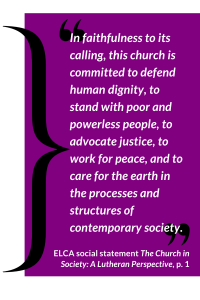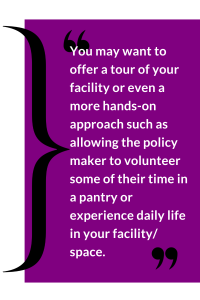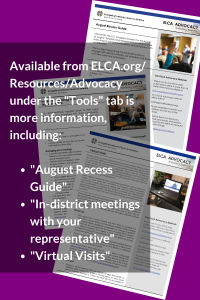As the state of Nevada awaits the November 2024 general election and start of its next biennial legislative session in February 2025, Lutheran Engagement and Advocacy in Nevada (LEAN) finds itself in a transition period with plenty of potential for growth in advocacy action ahead.
LEAN’s advocacy work is indeed central to God and the church’s continued presence in the world, and with so much ongoing need among what Jesus called “the least of these” in Matthew 25, the organization will continue speaking up for the voiceless, powerless and marginalized in Nevada, guide by the ELCA’s Social Statements.
A Successful Session
LEAN entered 2024 on the heels of a fruitful 2023 legislative session. A total of 12 bills supported by LEAN on the basis of its main areas of advocacy — Criminal Justice, Health Care, Education, Children and Family, and Housing and Human Dignity — were passed by the legislature and signed into law by Gov. Joe Lombardo thanks to the hard work of Advocate Bill Ledford, blessings of the LEAN Policy Council, and continued support of Evangelical Lutheran Church in America congregations throughout the West, especially those in the Grand Canyon Synod (Southern Nevada) and Sierra Pacific Synod (Northern Nevada). While other supported bills did not make it to the governor’s desk, the session as a whole yielded positive, justice and fairness-driven change at the state level as the world continued to recover from the economic and social shocks of the Covid-19 pandemic.
Fond Goodbyes
The year 2023 also brought loss to the LEAN family.
On April 15, Larry Struve, who for more than a decade led the advocacy efforts for LEAN and its previous incarnations including Lutheran Episocopal Advocacy in Nevada, Lutheran Advocacy Ministry in Nevada and the Religious Alliance in Nevada, passed at age 80 after a long illness. Larry spent more than 26 years in public service, including stints in the Nevada Attorney General’s office and Washoe County District Attorney’s office, and as Director of Nevada’s Commerce Department and Director of Business Finance and Planning for the Nevada Department of Business and Industry. He was also a lifelong member of Lutheran Church of the Good Shepherd in Reno.
Larry set the standard for faith-based advocacy in the state, chronicling his efforts in his 2013 book A Humble Walk for Justice: Advocacy for the Least of These in Nevada, 2001-2012. “When the simple act of advocacy directed at the hearts and minds of those entrusted to govern made policy decisions that better served the common good, something was at work that appealed to the better nature of those officials,” he wrote in the book’s introduction. “The words spoken by an advocate, grounded in the wisdom of scripture, helped define what justice required in modern times.”
Larry’s successor, Mike Patterson, passed on November 13. An ordained Episcopal priest and former school teacher, Mike acted as LEAN’s legislative advocate for several years, speaking strongly for state support of the public education system and stronger laws against the scourge of human trafficking. He also led several direct community outreach efforts on LEAN’s behalf, including food drives for the Food Bank of Northern Nevada and what he called “Pencils for Pupils,” which provided school supplies to teachers in at-risk elementary and middle schools.
Larry and Mike were tireless, dedicated, and focused advocates on behalf of thousands of Christian believers in Nevada’s halls of power. Their spirits will live on as LEAN charts its way forward, toward the next legislative session and beyond.
Another Goodbye, New Challenges
In November 2017, LEAN named Bill Ledford as its new legislative advocate on the recommendation of Mike Patterson, who went on to mentor Bill during the 2019 session while continuing on as a policy board member (another experienced Christian advocate and board member, Allan Smith, also served as an interim LEAN advocate and advisor as well as a board member).
Recently relocated to Nevada from Oregon with a young family, Bill brought to LEAN a deep desire to live out his Christian faith as tireless voice for the state’s marginalized residents, including LBGTQI+ communities. He served with distinction through three legislative session even as he attended Lutheran seminary and learned the liturgical and leadership ropes as an intern at Lord of Mercy in Sparks, Nevada. He completed his studies and was recommended for ordination as the new year dawned.
Bill’s commitment to Christian leadership and service was realized with his calling to be pastor at Prince of Peace Lutheran Church in Logan, Utah, a congregation in the Rocky Mountain Synod of the ELCA. He was ordained as pastor of word and sacrament at Lord of Mercy on March 3 with Rocky Mountain Bishop Jim Gonia presiding, and will begin his pastorate in Utah on March 10.
Bill’s blessed departure positions LEAN at an important crossroads, with much discernment and direction to be undertaken and pursued over the balance of 2024, with input from national and synod leaders, congregations and their pastors, and other interested parties.
While the policy board update its partnership agreements and job descriptions in preparation to seek and identify at least one new legislative advocate—and perhaps two, representing the northern and southern halves of the state—longtime board member Vic Williams will serve as as connection point for Bill’s ministry partners throughout the west and state, reaching out to stakeholders to maintain a continuous conversation regarding ideas, goals and best practices. Meanwhile, the policy board will continue its work to identify and welcome new members to its ranks, with the goal of establishing proper representation from all corners of the state. The board nominally meets monthly via Zoom with the legislature is in session and at least bimonthly during off years, and strives to meet in person periodically as well.
Broad goals for LEAN in the near term also include:
• Identifying and recruiting contacts at the congregational level to keep members apprised of activities, events and advocacy opportunities, and inviting policy input at the pew level
• Planning and coordinating informative, effective, and useful events on a regional or congregational basis. These could include seminars on various public needs and ministry goals, led by LEAN and its advocacy partners, non-profit organization and public assistance agencies, and other stakeholders
• Work more closely with other organizations and agencies to identify opportunities for fundraising and volunteer involvement
LEAN will post updates on policy objectives, staffing and board progress, and other news in the coming months. In the native, Nevadans who feel called to become a LEAN policy board member or serve in some other capacity can contact Vic Williams at vwilliams@leanforjustice.org.
LEAN POLICY BOARD
Pastor Diane Drach-Meinel, President
Dr. Ed Cotton, Vice-President
Vic Williams, Secretary/Treasurer
Pastor Mari Larson, At-Large Member



